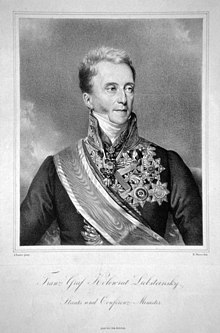Franz Anton von Kolowrat-Liebsteinsky

Count Franz Anton von Kolowrat-Liebsteinsky (Czech František Antonín Kolovrat-Libštejnský ) (born January 31, 1778 in Prague , † April 4, 1861 in Vienna ) was a Czech nobleman and Austrian statesman who, as a moderate liberal, opposed Prince Metternich on the Congress of Vienna became, although both represented the Austrian Empire . Kolowrat was a member of the Regency Council for Emperor Ferdinand I.
Life
Count Franz Anton Kolowrat -Liebsteinsky came from a family of the Bohemian aristocracy and, because he was an Austrian civil servant from Bohemia, was appointed the Count of Prague Castle. This office corresponded to the title of Austrian governor of Bohemia. Throughout his life he was a great admirer and promoter of the Bohemian-Czech culture, the development of which he strongly promoted in the years 1809-1826. But not only the culture, also the Bohemian national endeavors found the approval of Count Kolowrat-Liebsteinsky. Franz Anton was not only needed as a provincial civil servant, under Emperor Franz I and Ferdinand I he was the financial and administrative expert par excellence.
When he was relieved of his position as governor in 1826, Emperor Franz I made him Minister of State. Count Franz Anton thus largely had to direct the domestic affairs of Austria. Franz Anton was a member of the Austrian Secret State Conference from December 12, 1836 until the March Revolution on March 13, 1848 . The as liberal force politicians was for domestic policy and for Finance in charge.
When Emperor Franz I died in 1835, his mentally retarded son ascended the Austrian throne as Ferdinand I. The regency was exercised by the Secret State Conference , in which the two statesmen Metternich and Kolowrat-Liebsteinsky set the tone. But the differences that existed between the State Chancellor and State Minister largely brought Austria's domestic policy to a standstill. This standstill was characteristic of the Vormärz period.
As a result of the March Revolution of 1848, Prince Metternich, who was hated for his stoic-conservative attitude, had to resign and a Council of Ministers was formed, headed by Count Kolowrat-Liebsteinsky. He was the first constitutional prime minister of the Austrian monarchy . However, he only held this office from March 20 to April 19, 1848. After that, his political career ended leisurely without attracting any further attention.
Count Kolowrat-Liebsteinsky was president of the Royal Bohemian Society of Sciences and founder of the National Museum , to which he donated his mineralogical collection and library.
Today's Schubertring , part of Vienna's Ringstrasse, was named 1862–1928 after the Count's Palais on Schwarzenbergstrasse Kolowratring (which was demolished in 1869) .
Bearers of the medals
- Knight of the Order of the Golden Fleece
- Grand Cross of the Leopold Order
- Knight of the Order of St. Andrew
- House order of the diamond crown
- Knight of the Order of Saint Anne I Class
- Knight of the Order of St. Vladimir
- Knight of the Order of the White Eagle
- Knight of the Alexander Nevsky Order
- Grand Cross of the Order of St. John of Jerusalem
literature
- Count Kolowrat . In: Illustrirte Zeitung . No. 15 . J. J. Weber, Leipzig October 7, 1843, p. 226-227 ( books.google.de ).
- Constantin von Wurzbach : Kolowrat-Liebsteinsky, Franz Anton Graf . In: Biographisches Lexikon des Kaiserthums Oesterreich . 12th part. Imperial-Royal Court and State Printing Office, Vienna 1864, pp. 392–396 ( digitized version ).
- Franz Freiherr von Sommaruga: Kolowrat-Liebsteinsky, Franz Graf . In: Allgemeine Deutsche Biographie (ADB). Volume 16, Duncker & Humblot, Leipzig 1882, pp. 488-491.
- Walter: Kolowrat-Liebsteinsky Franz Anton Graf von. In: Austrian Biographical Lexicon 1815–1950 (ÖBL). Volume 4, Verlag der Österreichischen Akademie der Wissenschaften, Vienna 1969, p. 97.
- Adam Wandruszka : Kolowrat-Liebsteinský, Franz Anton Graf von. In: New German Biography (NDB). Volume 12, Duncker & Humblot, Berlin 1980, ISBN 3-428-00193-1 , p. 474 f. ( Digitized version ).
Web links
- Entry on Franz Anton von Kolowrat-Liebsteinsky in the Austria Forum (in the AEIOU Austria Lexicon )
Individual evidence
- ↑ Handbook of pathological anatomy, by Freiherr von Karl Rokitansky, published in 1846, Vienna, Braunmüller and Seidel
| personal data | |
|---|---|
| SURNAME | Kolowrat-Liebsteinsky, Franz Anton von |
| ALTERNATIVE NAMES | Kolowrat-Liebsteinsky, Franz Anton Graf von; Kolovrat-Libštejnský, František Antonín |
| BRIEF DESCRIPTION | Austrian statesman |
| DATE OF BIRTH | January 31, 1778 |
| PLACE OF BIRTH | Prague |
| DATE OF DEATH | April 4, 1861 |
| Place of death | Vienna |
